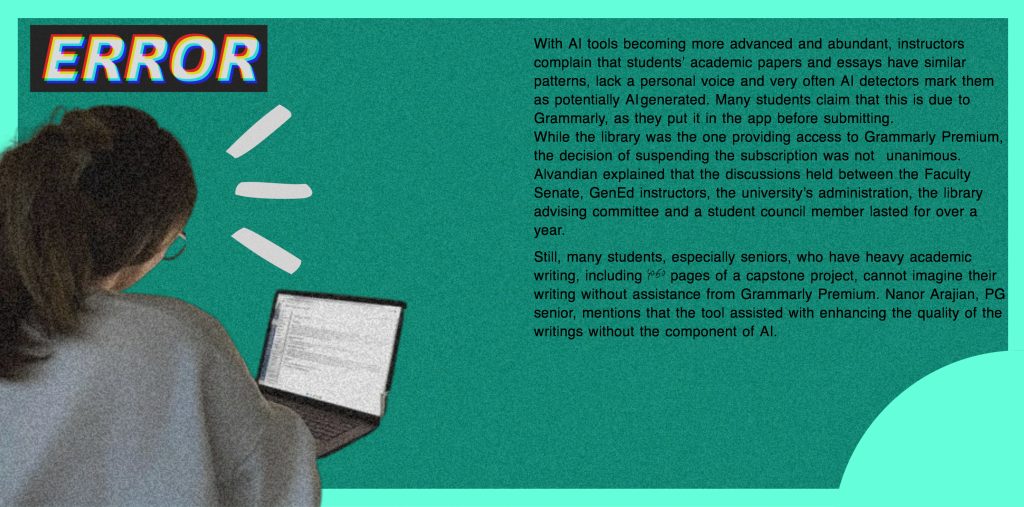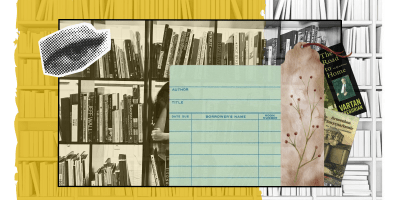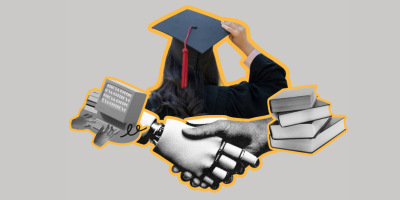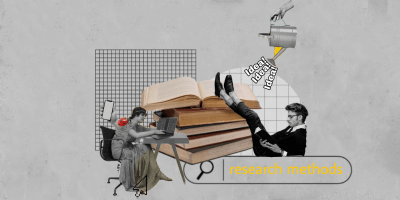
On Sept. 1, AUA stopped access to Grammarly Premium for all students, thus receiving a number of reactions from students. “AUA is cutting Grammarly Premium in two days while increasing the tuition…” I read on an anonymous poster near the university stairs. Later, I began hearing complaints from students that the university is cutting Grammarly Premium, thus taking an important tool that helps students improve their written papers.
For some, this was not fair, as the recent graduates used to have Grammarly Premium at AUA for their entire academic journey. Others were confused, not knowing how it would impact their academic writing. Why the university decided to no longer provide this tool so abruptly, causing students to panic and why they have become so dependent on Grammarly is unclear.
Grammarly Premium is a paid subscription for Grammarly, provided by the AGBU Papazian library. The annual subscription costs around $144 per person. The tool checks grammatical, spelling, punctuation and stylistic errors, making the writings smoother.
However, recently, it has become more than a basic grammar corrector, offering advanced features like vocabulary enhancement, tone adjustment and plagiarism detection and even an AI component to compose ideas and improve them.
The library has provided Grammarly Premium since 2017. Laurie Alvandian, the director of the library, says “The initial idea for Grammarly was that the library wanted a tool to assist students with academic papers, as English is not their native language. “But Grammarly was moving way more toward efficiency and not the learning process and this was hurting students’ abilities with their writing skills,” she says.
With AI tools becoming more advanced and abundant, instructors complain that students’ academic papers and essays have similar patterns, lack a personal voice and very often AI detectors mark them as potentially AI-generated. Many students claim that this is due to Grammarly, as they put it in the app before submitting.
While the library was the one providing access to Grammarly Premium, the decision of suspending the subscription was not unanimous. Alvandian explained that the discussions held between the Faculty Senate, GenEd instructors, the university’s administration, the library advising committee and a student council member lasted for over a year.
Still, many students, especially seniors, who have heavy academic writing, including 40-60 pages of a capstone project, cannot imagine their writing without assistance from Grammarly Premium. Nanor Arajian, PG senior, mentions that the tool assisted with enhancing the quality of the writings without the component of AI. She raises concerns about challenges of writing her capstone project. “I do not believe its absence would devalue my capstone but it would have helped to save some time to not focus and think about the clarity and flow of the paper as it would suggest changes to improve it,” she says.
To this, Alvandian responds that Grammarly provides basic grammar, punctuation, and spelling checks for free. The library’s goal is to help students with their research and academic writing, so they have new subscriptions. “New subscriptions will really increase learning opportunities rather than disable students from developing their skills, as education is about learning, not efficiency,” she explains.
Still, stopping Grammarly Premium’s access does not mean that the library stops providing students with other tools. Alvandian mentions that the library has subscribed to new academic sources to help students with their research.
The library provides Project Muse, a platform for scholarly journals and ebooks in the arts, humanities, and social sciences. Fields covered include cultural studies, economics, education, gender studies, history, political science, literature and literary criticism, and visual and performing arts, which contain over 700 scholarly journals for over 100 publishers. It will help with further research.
Another platform the Library provides is Digital Theatre+, an educational platform for performing arts that gives access to theatre productions and educational resources to support the teaching of English and Drama. It gives students a unique opportunity to get to know the first-class world of theater and the initial trial will be available for six months, until March 31, 2026.
Ancestry Library, which gives access to genealogical databases and historical records, including U.S. and international census, birth, marriage, death and immigration documents, had a trial subscription until Nov. 1.
AP Stylebook Online, which is for MAMJ students, will help them get acquainted with the most used Associated Press style, the main guidebook of journalists.
The last trial is PressReader, an international digital newsstand providing access to over 7,000 newspapers and magazines from around the world with issues dating back to 2004 in their original full-page format, which will be available until Nov. 15, 2025.
While these subscriptions will help students with their research, it would be hard to continue our academics without Grammarly Premium, as we have used it for three years. “I would rather choose to bring back Grammarly Premium as we have a lot of databases, however, the amount of students who use Grammarly rather than those sources are much higher. During these 4 years I have never faced an issue of finding a source I needed either from the library database or independently,” Arajian says.
Whether or not it is going to decrease usage of AI, or the quality of writing, we need to learn to think for ourselves instead of depending on such tools. In the end, it’s not about the tools we use, but about how we choose to think and write on our own.












